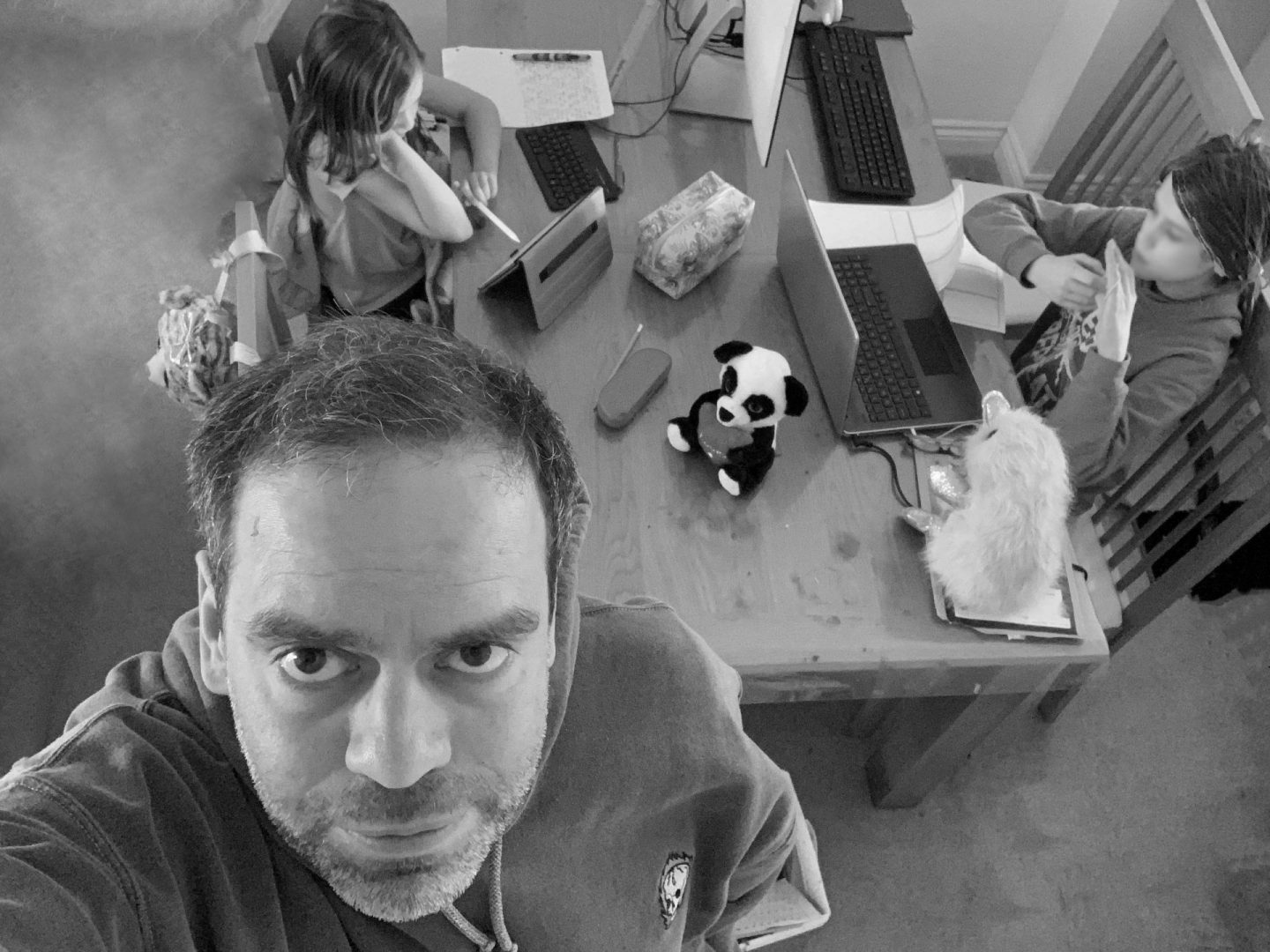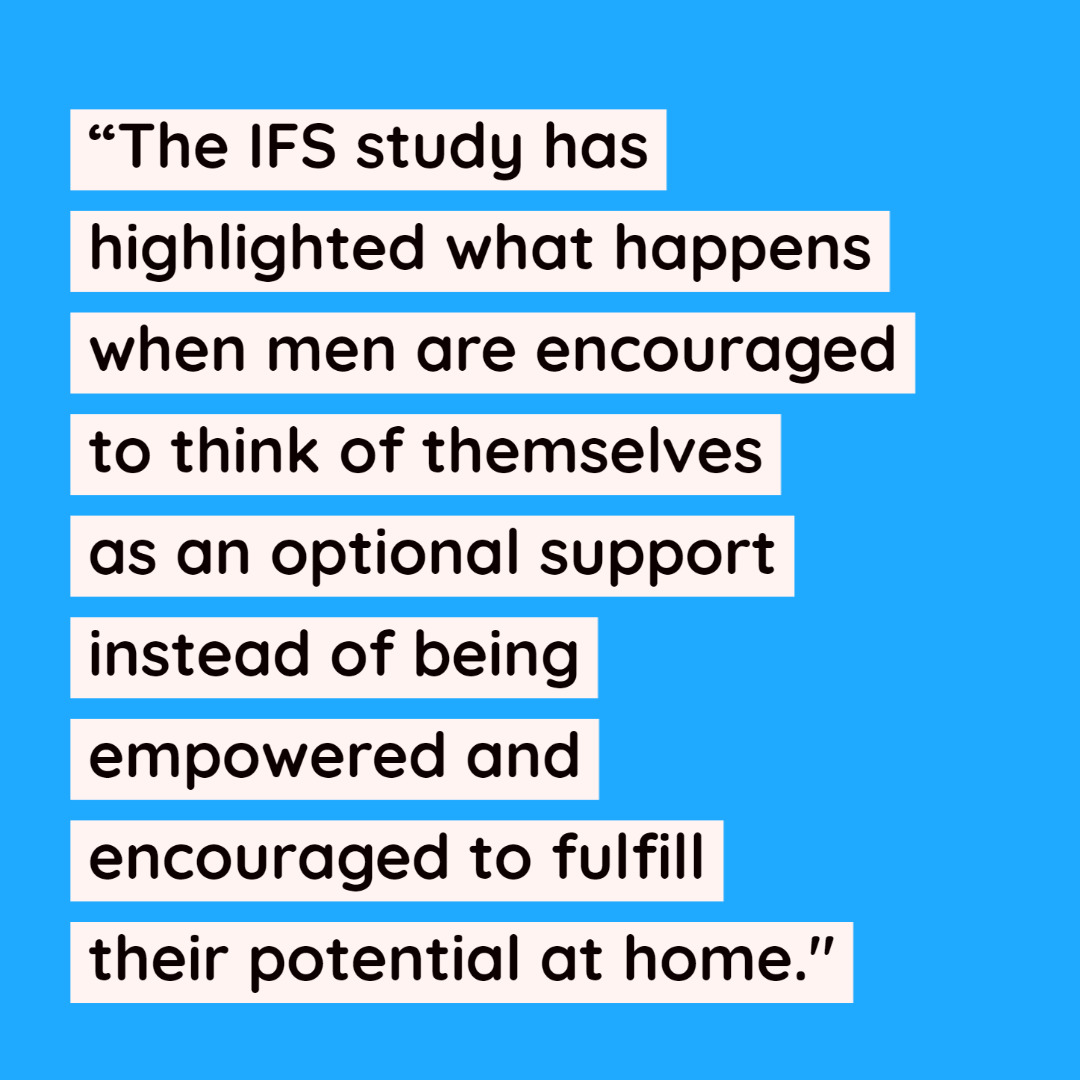Behind a shut door on the upper level of a family home, someone laughs while on a two-hour long Skype call with work colleagues. In the living room are two children playing a video game on an Xbox. Sat at a messy dining table in the corner of the room is the children’s other parent, typing furiously on a keyboard. They are surrounded by the detritus of breakfast prepared for the children earlier in the morning. Also on the table are condiments left out from lunch three days ago, various bits of mail and discarded schoolwork.

This is surely a typical scene in a typical British family home during the COVID-19 era? Well, it’s typical of my household and says a lot about how bad we have got at clearing the dining table away after mealtimes!
You may have noticed I didn’t identify the gender of the person in the office or the adult at the dining table. A study published yesterday by the Institute of Fiscal Studies looking at the work/life balance between heterosexual couples during Coronatime suggests it should be a man in the home office and a woman surrounded by the mess of family life.
Not so. The person safely ensconced in the office on the Skype call was my wife. I was the one sat at the dining table watching over the children the children while also trying to do my gig-economy day job as a freelancer and social media influencer.
I was based in the upstairs office until late March. As soon as my wife and her colleagues were instructed to work from home and the schools closed and lessons moved online, I knew I had no option but to move my computer and printer to the dining room table. I would somehow juggle my paid work while overseeing the children’s schoolwork from there. This is how we would be balancing work and family during lockdown.
I’m a work form home dad and have been the kids’ main carer for the best part of a decade. It’s me that deals with the teachers and the school so I know who to message in case of any problems.
My wife is the main earner between the two of us. Her job also involves being on Skype, Zoom or phone calls for several hours each day. It simply wasn’t going to be practical for her to get heavily involved in homeschooling during lockdown.
The IFS research, however, found that women working from home at the moment are interrupted 50% more often than men working from home. In my experience, these interruptions will almost certainly come from children having IT issues or, more likely, wanting snacks (sound familiar?). Oh, and my wife maybe gets interrupted once a day, twice at most whereas I can barely go for 20 minutes without a request for assistance.
The IFS researchers concluded that time pressures on parents are immense, with childcare taking up nine hours of the day, housework three hours and paid work three hours (keep in mind these are average figures so they will vary enormously between households).
Unfortunately, women have borne the brunt of the Coronatime job losses. They are also more likely to have been furloughed. With women often working in the hardest hit sectors, the IFS has concluded that it will take longer for women to get back to work and recover economically.
The research found women are doing more around the home than than men. The best case scenario is in households where both mum and dad have been furloughed, although even then women end up doing more domestic chores.
Sadly, this research about balancing work and family during lockdown has been presented to the world as a Man v Woman story. Mothers are Being Penalised for Continued Closure of Schools, said the Daily Telegraph. Coronavirus: Mums do Most Childcare and Chores in Lockdown, claimed the BBC. Coronavirus latest: Mothers Disproportionately hit by School Closures, Job Losses, Furloughing and Working From Home, said the i newspaper which, to its credit, was the best and most accurate of a pretty bad bunch.

To me the research has highlighted one positive, if imperfect, development. Overall, there has been greater involvement between men and their children. Prior to lockdown, men did childcare during fours of the day. Since March, that’s doubled to eight hours of the day. Better than that, the researchers have suggested this could have “long lasting impacts” on how couples divide up childcare.
In families where fathers have stopped working and mothers haven’t, the couple are generally sharing childcare and housework equally. The downside is that working mums are balancing this with five hours of paid work a day.
It’s that final point that I feel deserves real analysis. We need to understand why women who work find themselves doing a disproportionate amount of domestic work at home.
Ultimately, the IFS’s research is further evidence that poorly designed parental leave policies and employment policies place the childcare burden on women. This forces many women to give up paid work or take less demanding roles when they become mothers so they can concentrate on the family. Men, meanwhile, are often back in the workplace after a short spell of paternity or Shared Parental Leave (SPL).
Many men are not around their children long enough to learn the skills needed to look after their kids without assistance. In these circumstances, mum has to step in and ends up doing more around the home while also working.
In the early days of a child’s life, men receive a constant message that their role is to “support” the mother. The message men should receive is that they are an integral, central part of the family and equally important to mum. It’s a missed opportunity and the IFS study has highlighted what happens when men are encouraged to think of themselves as an optional support instead of being empowered and encouraged to fulfill their potential at home.
While things are improving, employers do not always help the situation. A man’s request to work flexibly is twice as likely to be turned down as a woman’s. Many employers pay women enhanced maternity benefits but when it comes to paternity pay, men frequently receive the statutory minimum. Sadly, I also hear stories of employers doing what they can to stop men taking SPL. This says a lot about the sexist attitudes of some employers who think men’s presence in the workplace is more important than women’s.
It was once put to me like this: Mother does not know best, practice makes perfect. It’s a phrase I often use. I could not agree more with that statement and it explains why my household works the way it does.
As a family we took the decision years ago that I’d do the childcare and domestic stuff and my wife would concentrate on her career. Since then I have simply developed a better idea of how to make things work (along the way I accidentally launched another career as a dad blogger but that’s a whole other story!). It has nothing to do with gender and everything to do with the choices we made.
I spend more time with my kids than my wife. I have a better understanding of their curriculum, I know their teachers, I know who their friends are, who their friends’ parents are, what they’ll eat and so on. When lockdown came, dealing with these things was always going to fall on me.
When Coronavirus came to town back in March, I could see the way things were going to be. I immediately tried to work out which jobs I get away without doing. I told my wife I would not be touching an iron until the COVID-19 crisis had passed. With the exception of ironing a couple of linen items, I have held to that promise.
I also told my wife that evening meals would be her responsibility. That’s the way we’ve rolled since March and that’s how things have worked for us.
Getting back to the IFS research, there are two things I hope people take from it. Firstly, that any differences in behaviour between the genders is because of the way women are raised to think of themselves as carers and men to think of themselves as providers. This is exacerbated by poor parental leave and employment policies and it does not help mums and dads when balancing work and family during lockdown.
Secondly, as the research stresses, this could be a time for real, positive change. Men are doing twice the amount of childcare they were doing just two months ago and flexible, remote working has become the norm for many, many people. Now is the time to cement that change in place so that women, men and children all benefit.
I couldn’t write an article like this without highlighting my involvement in the LinkedIn #Changemakers campaign. I am one of seven people campaigning for change in the workplace and my particular interest is to promote flexible working. Please do follow me on LinkedIn to find out more.







2 thoughts on “How are mums & dads balancing work and family under lockdown?”
Another great post John. I know exactly where your coming from with the snacks, it’s like they’re constantly hungry. As for the working balance it must be tough. As a stay at home dad that isn’t working I don’t have to do this kind of balancing but my partner has been home with her Uni classes moved online and assignments to be done from home. It’s a difficult balance making sure she has the time to crack on with her stuff and dealing with 4 young children and homeschooling. It’s tricky.
Your doing a great job John, keep it up sir.
And I am sure you are doing a great job too Eddie! The ways it was put to me recently was that we’re not homeschooling, we’re dealing an international health pandemic and just doing our best in the circumstances.
The impact of the constant snacking is fascinating. I have to constantly remind the kids to eat fruit and even so, our bin is now rammed with food wrappers! It never used to be.